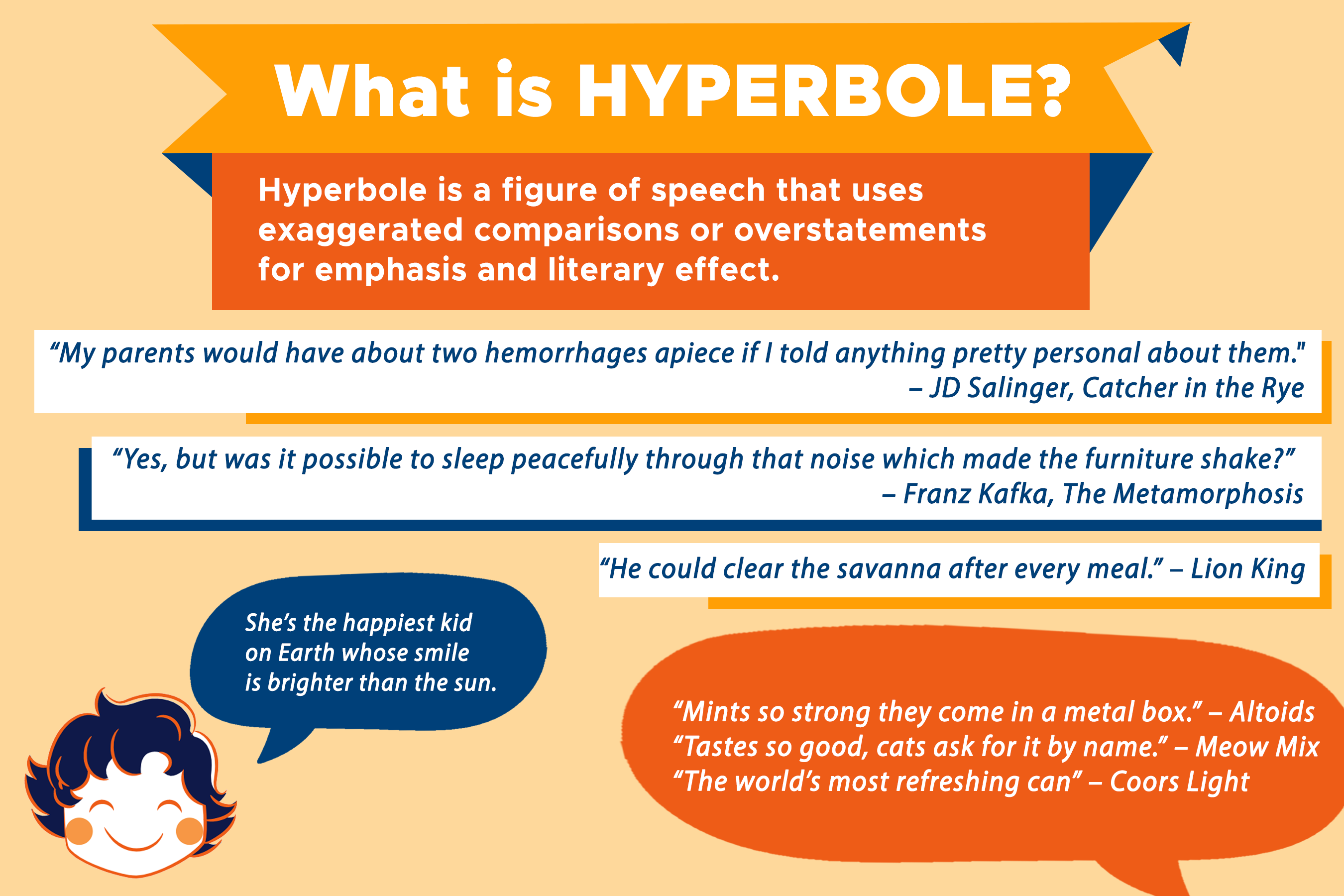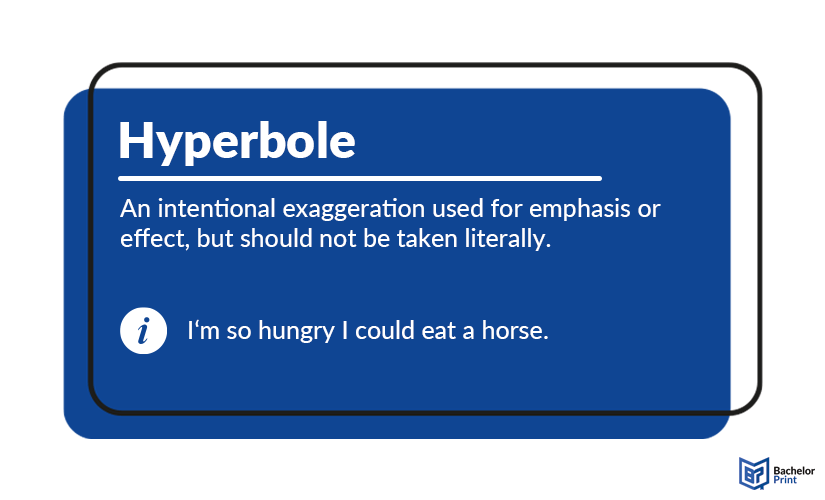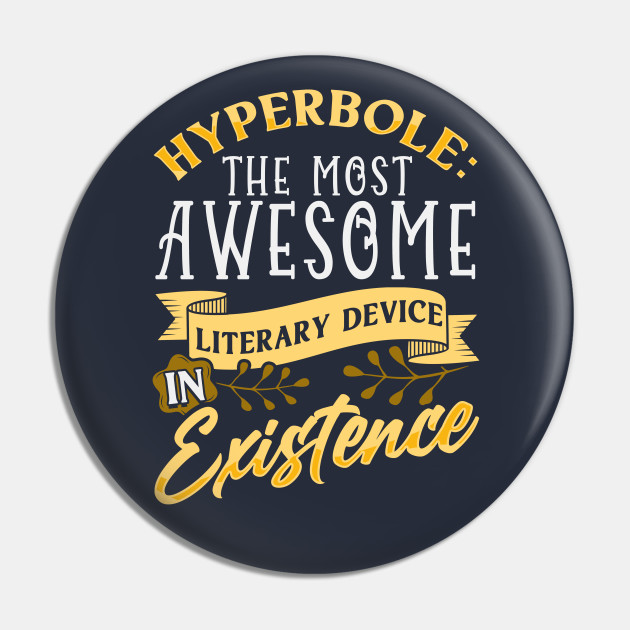Hyperbole is one of the most effective and engaging literary devices in English literature. By using exaggeration for emphasis, writers can create humor, drama, irony, and heightened emotion in their works. Whether it’s Shakespeare declaring “All the perfumes of Arabia will not sweeten this little hand” or Mark Twain humorously stating “I was so hungry I could eat a horse,” hyperbole helps readers connect with the intensity of an idea, emotion, or situation.
In this article, we will explore:
- The definition and function of hyperbole.
- How hyperbole enhances literary meaning and emotional impact.
- Famous examples of hyperbole in English literature.
- How writers use hyperbole for humor, drama, and persuasion.
- Techniques for effectively using hyperbole in writing.
What is Hyperbole? A Definition

Hyperbole is a figure of speech that involves deliberate exaggeration for emphasis or effect. It is not meant to be taken literally but rather to intensify emotions or descriptions.
🔹 Example: “I’ve told you a million times!”
➡ No one has literally said something a million times, but the hyperbole expresses frustration and emphasis.
📌 Why Do Writers Use Hyperbole?
- Create vivid imagery and strong emotional responses.
- Emphasize a point or make an idea more memorable.
- Add humor, irony, or dramatic effect.
- Make descriptions more engaging and imaginative.
Famous Examples of Hyperbole in English Literature
1. Shakespeare’s “Macbeth” – The Weight of Guilt
“Will all great Neptune’s ocean wash this blood
Clean from my hand? No, this my hand will rather
The multitudinous seas incarnadine,
Making the green one red.”
🔹 Analysis: In this passage, Macbeth expresses overwhelming guilt after committing murder. The exaggeration—that an entire ocean cannot wash away his guilt—intensifies the emotional weight of his crime.
2. Mark Twain’s “The Adventures of Tom Sawyer” – Playful Exaggeration
“Tom was literally rolling in wealth. He had, besides the things before mentioned, twelve marbles, part of a jew’s harp, a piece of blue bottle glass to look through, a spool cannon, a key that wouldn’t unlock anything, a fragment of chalk, and a glass stopper of a decanter. He had a whole wealth of articles of great value.”
🔹 Analysis: Twain humorously exaggerates Tom’s collection of useless trinkets, making it seem like an extravagant treasure trove. The hyperbole highlights Tom’s childlike imagination and adds humor to the scene.
3. John Milton’s “Paradise Lost” – Epic Grandiosity
“An army whose numbers exceeded the stars in heaven.”
🔹 Analysis: Milton uses hyperbole to describe Satan’s army, making it seem immeasurably vast and powerful. This exaggeration heightens the epic scale of the battle between good and evil.
4. F. Scott Fitzgerald’s “The Great Gatsby” – Wealth and Extravagance
“I waited, and about four o’clock she came to the window and stood there for a minute and then turned out the light.”
🔹 Analysis: Gatsby watches for Daisy every night, hoping for her attention. Though the exaggeration is subtle, the obsessive longing Gatsby feels is hyperbolic—it suggests he has been waiting endlessly, emphasizing his desperation.
5. William Blake’s “To the Evening Star” – The Power of Light
“The moon, like a flower, in heaven’s high bower,
With silent delight, sits and smiles on the night.”
🔹 Analysis: Blake personifies the moon with hyperbolic admiration, suggesting that it sits joyfully and knowingly in the sky. This poetic exaggeration adds beauty and emotion to the natural imagery.
How Hyperbole Enhances Literary Meaning

1. Creating Emotional Intensity
Hyperbole amplifies emotions, making readers feel the depth of a character’s love, fear, anger, or excitement.
📌 Example:
- “I love you to the moon and back.” → Emphasizes deep affection.
- “I was so nervous, my heart was pounding out of my chest.” → Expresses extreme anxiety.
2. Adding Humor and Satire
Writers often use hyperbolic humor to mock societal norms, exaggerate absurdities, or create irony.
📌 Example:
- In Oscar Wilde’s “The Importance of Being Earnest”, characters often speak in hyperboles to mock Victorian social expectations.
- “I can resist everything except temptation.” → Wilde’s use of hyperbole makes the statement both humorous and ironic.
3. Strengthening Persuasion in Speeches and Rhetoric
Public speakers, politicians, and advertisers often use hyperbole to make their arguments more compelling and dramatic.
📌 Example:
- “This is the best product you will ever buy in your life!” → Exaggeration to persuade customers.
- “Four score and seven years ago, our fathers brought forth…” (Abraham Lincoln) → The dramatic phrasing intensifies the historical significance.
4. Intensifying Description and Imagery
Hyperbole helps paint vivid pictures in the reader’s mind, making descriptions more engaging.
📌 Example:
- “The mountains touched the sky.” → Creates an awe-inspiring image.
- “Her eyes were as bright as the sun.” → Enhances the radiance and beauty of the subject.
Using Hyperbole Effectively in Writing
1. Match the Tone of the Text
Hyperbole should fit the mood and style of the writing. In a comedic work, exaggeration should feel playful. In a dramatic or tragic piece, it should heighten emotion.
📌 Example:
✔ Comedic: “I studied for a thousand hours for this test!”
✔ Dramatic: “This sorrow will last forever.”
2. Use Hyperbole Sparingly for Maximum Impact
Overusing hyperbole can make writing lose credibility. It should be strategic rather than excessive.
📌 Tip: Use hyperbole when you want to emphasize a key point, evoke strong emotions, or add humor—but avoid using it in every sentence.
3. Combine Hyperbole with Other Literary Devices
Pairing hyperbole with personification, metaphor, or simile can create even more powerful imagery.
📌 Example:
- “The wind howled through the trees like a furious beast, shaking the earth beneath its rage.”
➡ Combines hyperbole (shaking the earth), personification (wind howled), and simile (like a furious beast).
Conclusion: The Power of Exaggeration in Literature
Hyperbole is a timeless literary device that adds depth, humor, intensity, and persuasion to writing. From Shakespeare’s tragedies to Twain’s satirical humor, Milton’s epic poetry, and modern rhetoric, hyperbole allows writers to create memorable and impactful expressions.
Whether used for dramatic effect, comedic exaggeration, or persuasive rhetoric, hyperbole remains one of the most engaging tools in literature. So, next time you read a book, poem, or speech—look for the hyperbole—it might just be the most powerful line in the text!
📌 What’s your favorite example of hyperbole in literature knowledge? Share in the comments! ✍️📖🔥








